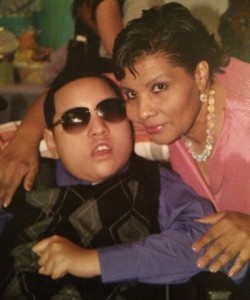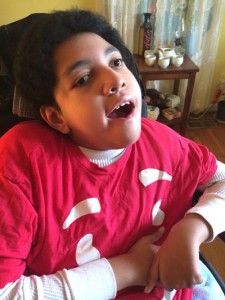Helena Frischtak, a third-year medical student working in different clinics and parts of the hospital as part of her training, contributed this post.
In the hospital, people come and go. Rooms take on new patients, and doctors take on different rooms. When you start to know a patient better, he or she is ready to go home, often never to cross paths with you, the medical student, again.
Yet some patients never actually leave you. That is perhaps my favorite thing about medicine: Doctors learn a lot more from patients than patients learn from them.
A Story About a Mom
This article, however, isn’t about patients. It is about those who are right next to the patient’s bed, who aren’t talked about in rounds when doctors discuss diagnoses and treatments, and whose names aren’t in our electronic medical record. But who – in my book – are big heroes, right next to the doctor. I’m talking about the patient’s caregivers.
Here in the pediatric unit, I have met many types of caregivers. They are mothers and fathers, grandparents and aunts, friends, social workers and shelter nurses. They are there every step of the way, living and breathing each patient’s progress and setbacks.
During my first week rotating at the UVA pediatrics unit, I met Mrs. West — a kind, resilient woman who you immediately know can teach you a lot. Her son, Spencer, has cerebral palsy, epilepsy, intellectual disability and severe scoliosis; he cannot speak, understand speech, walk or move his arms in a coordinated fashion.

One crisp Saturday afternoon in March, a few days after Spencer had been discharged from the hospital, I drove up the long, winding road to Mrs. West’s home to chat with her about taking care of Spencer. I was curious about it all: The daily hardships and fears, the lessons she had learned along the way and the big, existential questions brought on by life’s challenges (the “why?”). Our interview, transcribed below, showed me how Mrs. West’s love and devotion, as well as her faith, provide her with the strength she needs to face these significant challenges.
Mrs. West, tell me about Spencer.
Spencer is a 14-year-old special needs child; he has cerebral palsy, epilepsy and scoliosis. He’ll easily get sick: The common cold puts Spencer in the hospital, and it can often lead to pneumonia. Winter is a bit hard for us. The heat of the summer time can sometimes induce his seizures.
His favorite thing in life is eating! He has a 17-year-old sister, Jaz, who is very protective of him. She gets upset every time he is hospitalized. She knows the older he gets, the more his health declines, and it concerns her. We all love him. (Life expectancy of children with cerebral palsy is highly dependent on functional ability; only about 50 percent of seriously disabled children with cerebral palsy live past their 20s.)
Do you think he can feel the love?
Oh yes! He feels the love. He will grunt or make little sounds when he hears my mom or my daughter walk into the room and not speak to him. He is so spoiled!
You mentioned the other day that you aren’t only a mother, but a nurse, a lawyer, a doctor…
I am a doctor when it comes to his health, a lawyer when it comes to his rights, a nurse because I take care of him, a cook because I provide for him. Everything I do for myself, I also do for Spencer. I am two people in one; I’m a 52-year-old adult and a 14-year-old male. I don’t have a written degree; I didn’t go to school for all those things; but I live it— I live it every day.

What has Spencer taught you?
He has especially taught me patience. I have to be on his time. You cannot rush someone who has special needs, not when he is eating and less so when he is recovering from an illness. When I prepare him for a doctor’s appointment or our religious service, I have to prepare 3-4 hours ahead to get us there on time.
Do you ever ask yourself “Why me?”
I don’t ask that because I know if it wasn’t me it would have been someone else, and because of my faith, I understand we live in an imperfect world. I took care of myself during my pregnancy; I never smoked, drank or did drugs. I had genetic testing done on Spencer, and he was one of 4,000 males with this particular epileptic gene. So I don’t ask myself why, I know it’s just a part of life.
When you think back to how much your life has changed since he was born and your husband passed away, would you take any of it back?
No. Even if I knew that my husband would die, that Spencer would be disabled, and I would be left a single parent, I still would repeat that life. Because I had a good husband and my children had a good father. He was a good provider; he was loving and he was kind… but he was short-lived. We almost made it to our 10-year anniversary – he had booked a cruise for us— but he died one month before.
Yet I had nine years and 11 months of true marriage, true love; some people are married 40-50 years and still haven’t experienced that. I would rather take what I got and know it was real, than have more years and not experience that at all.
You stopped working when your husband passed away to take care of Spencer. How do you support yourself?
Yes, Spencer is my full-time job. For the past 14 years, my husband’s social security benefits are all we have, and it is how I’ve supported my family. It’s a very tight budget; I know where every penny is going. If I had more money we would live in a more handicapped-friendly house. Because he’s getting bigger, the wheelchair is getting bigger, but the walls aren’t getting any bigger.
Do you ever think about who will outlive whom?
I do, and I wonder how long Spencer’s lifespan may be, especially with the health issues that will come along. I pray to God to let me live to take care of Spencer and Jaz. I hate to say it, but if he expires first, I’m okay with it because I know he was taken care of by me. But if I die … I do think about it, but I don’t dwell on it.
You told me you always wonder about what Spencer would say if he could talk.
He would say: ‘Mommy, I love you, and thank you for taking care of me.’ He would be a Momma’s boy. He would love our family. We do a lot of bird watching, so maybe he would be an outdoors person.
Do you have any words of advice for other families of children with disabilities?
It’s a big responsibility (taking care of a disabled child), but it’s just my life, and I don’t know it any other way. I’m not going to say I don’t get sad or that I don’t cry. But not enough to get me down that I can’t move, that I can’t live and that I can’t take care of my family. Personally, I find that reading Rev 21:3,4 in the Bible helps me through hard days.
For everyone who has special needs children: appreciate them, because whether you know it or not, they’re teaching you something. They are teaching you love, kindness and patience, even without a word.
